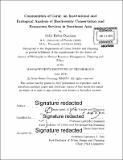Communities of coral : an institutional and ecological analysis of biodiversity conservation and ecosystem services in Southeast Asia
Author(s)
Dunning, Kelly Heber
DownloadFull printable version (28.18Mb)
Other Contributors
Massachusetts Institute of Technology. Department of Urban Studies and Planning.
Advisor
Lawrence Susskind.
Terms of use
Metadata
Show full item recordAbstract
This dissertation examines two countries, Indonesia and Malaysia, and their pathways to implementing the international Convention on Biological Diversity (CBD), specifically focused on how regional and national policies in Southeast Asia have fared when implementing the Aichi Targets of the CBD. These include both safeguarding ecosystems through protections and ensuring that benefits from ecosystems can be enjoyed by all. I examine CBD implementation through marine protected areas (MPAs) for corals reefs in both Indonesia and Malaysia. Coral reefs (along with mangroves and seagrass) allow stakeholders livelihoods in fisheries and tourism, and they are also efficient natural barriers to extreme weather events and climate change related hazards. Whereas Indonesia uses a co-managed framework to implement its MPAs where villages and governments share power, Malaysia uses a top down network of federally managed Marine Parks. I use mixed methods through interviews and surveys as well as coral reef ecology surveys conducted over a year of fieldwork to argue that co-managed systems are the current best practice for implementing the CBD's Aichi Targets in tropical developing countries. Not only do they prevent ecosystems from many local forms of degradation, but they also are seen as more legitimate by local resource user stakeholders, allow them more adaptive capacity to manage the ecosystems under conditions of uncertainty, and allow for a more integrated form of management whereby ecological, economic, and social considerations can be made for management decisions. Centralized MPAs can mimic the successes of co-managed systems through better forms of stakeholder engagement, possibly with greater socio-ecological success in the long run due to their superior financial, administrative, and organizational powers.
Description
Thesis: Ph. D. in Natural Resource Management, Planning and Policy, Massachusetts Institute of Technology, Department of Urban Studies and Planning, 2016. Cataloged from PDF version of thesis. Includes bibliographical references (pages 251-275).
Date issued
2016Department
Massachusetts Institute of Technology. Department of Urban Studies and PlanningPublisher
Massachusetts Institute of Technology
Keywords
Urban Studies and Planning.